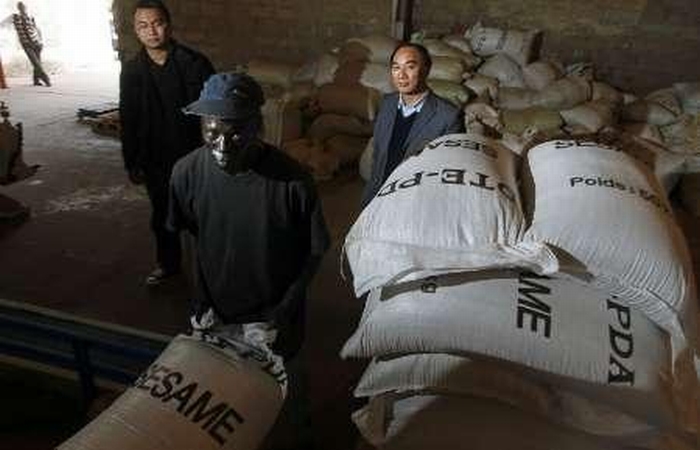Reuters | Wed Feb 11, 2009
By David Lewis
DAKAR (Reuters) -- Chinese companies are lining up to invest in African agriculture, but governments like Senegal must do more to limit the risks for investors, a veteran Chinese investor said.
Chinese markets remain hungry for crops grown in Africa and the money, jobs and expertise they bring will help, not exploit, the world's poorest continent, Riping Ouyang, who has over 20 years experience in African agriculture, said this week.
"It would be difficult to convince those who don't know agriculture in Africa to invest in this sector," Ouyang told Reuters in Senegal, where he has a sesame production business.
"If there are no examples, people won't take risks. But if we succeed, others will follow. That is why our project is sensitive for the Chinese and Senegalese governments," he added.
Ouyang, managing director of DATONG Enterprises, which operates across West Africa, spoke to Reuters ahead of a visit this week by China's President Hu Jintao to Mali, Senegal, Tanzania and Mauritius, all relatively stable but poor countries.
Sino-African trade has jumped from around $10 billion per year in 2000 to over $106 billion last year. Analysts say Hu will try and show that China's interest in the continent extends beyond extractive industries in resource-rich countries.
Known more for importing oil and minerals and exporting cheap goods to African markets, Chinese diplomats have been quick to underscore trade in goods such as Ethiopian sesame, Egyptian cotton and Zimbabwean tobacco ahead of Hu's visit.
More than 450 products from more than 30 of Africa's poorest countries are exempt from import tax in China, encouraging $680 million in exports from Africa by 2008, according to one Chinese briefing.
Ouyang said he set up his business last year after Beijing encouraged private Chinese companies to invest in Mali, Burkina Faso and Senegal, saying there "weren't enough" investments in crops like sesame, ground nuts and rice in the region.
He has also taken advantage of an ambitious 345 billion CFA franc agricultural programme that Senegal, one of the world's largest food importers per capita, launched last year after violent demonstrations against high food prices.
Under the scheme, known by its French acronym, GOANA, investors are offered tax breaks on customs duties and value added tax. Foreign exchange controls have also been lifted for five years to free investors to take profits out of the country.
Ouyang says DATONG invested over 3 billion CFA francs in its first six months, setting up a factory in Dakar and providing farmers' associations with credit for seeds and fertilisers.
The company, which buys, cleans and bags the sesame for export, plans to invest well over $5 million a year over the next five years and hopes to produce 150,000 tonnes of sesame per year for export to China, Latin America and Europe.
WARNING TO THE GOVERNMENT
He said it was too early to estimate this season's sesame harvest, which began in November and runs to the end of March.
Farmgate prices are currently at 250 francs/kg, up 5 francs since November but less than half the $1,200/tonne price once cleaned and shipped to China, he said.
But just six months into operations, the firm is already facing problems recovering financing. Ouyang said some farmers are selling produce to other buyers who can offer higher prices as they do not have the overheads of investing in associations.
"We've warned the Senegalese government and called them to help us recover credit and supervise associations, he said.
"If there are no guarantees, who will want to invest in this game? We have done our part but we are appealing to the Senegalese government to help us move forward," he added.
Applauded by some for their "no strings attached" approach to Africa, others accuse the Chinese of exploitation.
Ouyang rejected that charge as "absurd", saying his business was a model of how both parties could profit from a scheme that involves 200,000 people and 35,000 hectares of land in Senegal.
"We have a large market in China and here, there is the land and the workforce ... Have I come to exploit? On the contrary, I come to invest. I'm throwing money (into) here," he said.
"If we hit 150,000 tonnes, how many billions (of francs) will that bring the country? Money is coming into the country, it is going into the hands of the farmers. That is poverty reduction," he said.
[Photo: Riping Ouyang (R), a Chinese investor, watches as a local worker stacks bags of seeds in a sesame factory in Senegal's capital Dakar February 11, 2009. Chinese companies are lining up to invest in African agriculture, but governments like Senegal must do more to limit the risks for investors, Ouyang, a veteran Chinese investor with over 20 years experience in African agriculture, said. REUTERS/Normand Blouin (SENEGAL)]











